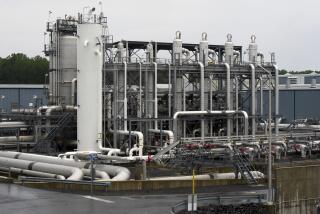Clinton Blames GOP on Oil Policy
- Share via
WASHINGTON — Facing a mounting public outcry over rising gas prices, President Clinton lashed out at Congress on Saturday for failing to protect the nation’s energy security.
Just days after lobbying the Organization of Petroleum Exporting Countries to boost its oil output, Clinton criticized Congress for not renewing his authority to tap government oil reserves under the federal Energy Policy and Conservation Act.
Congress “has failed to take one of the most critical steps necessary to maintain America’s energy security”--an extension of the federal energy conservation law, Clinton said in a two-page letter sent to Speaker J. Dennis Hastert (R-Ill.). Clinton urged Hastert to seek House approval for a range of measures the president said was vital for a “sound, comprehensive energy strategy.”
Hastert could not be reached Saturday, and his press secretary declined comment. But a Hastert spokesman quoted by Associated Press called Clinton’s letter “political posturing.’
Since the beginning of the year, several members of Congress have called on Clinton to release oil from the government’s reserves to ease the financial strain on motorists at the gas pump as well as on homeowners who rely on oil to heat their homes.
Sen. Charles E. Schumer (D-N.Y.), for instance, has proposed a bill to sell crude oil from the government’s reserves that could be replaced by industry buyers when prices fall.
Clinton’s authority to draw from the government’s oil reserve expired Friday when the House failed to act on a measure to extend authorization an additional four years.
The release of government oil reserves might have cut gas prices as much as 10% at the pump but would likely have little effect now that OPEC nations have agreed to boost production, said Philip K. Verleger, an energy economist with the Cambridge, Mass.-based consulting firm Battle Group.
“Oil prices are already headed down,” said Verleger. “Clinton has resisted doing this from January and February . . . he should have acted much sooner.”
Other experts, however, said the president should not interfere with the volatile oil market.
“Using the strategic petroleum oil reserves for anything other than a dire national emergency is a mistake,” said David Pursell, vice president of upstream research for Houston-based Simmons & Co. International.
Since it was established in 1975, after OPEC-sponsored production cuts sent U.S. gas prices surging in the mid-1970s, the government’s strategic petroleum reserve has sparked controversy over what conditions must exist to trigger its use by the president.
Only once in the past quarter century has the reserve been used. Former President Bush’s partial drawdown of oil reserves at the beginning of the Persian Gulf War in 1991 helped slash the price of a barrel of oil to $21 from about $31, in less than a week.
U.S. gas prices have risen more than 25% recently and now average above $1.60 a gallon. Clinton has not withdrawn oil from the government’s stockpile, although White House officials said the president has not ruled out a drawdown if he regains the authority to do so.
In his letter to Hastert, Clinton said that “the option to use the Strategic Petroleum Reserve is an essential line of defense against an interruption in oil supplies.”
Clinton called renewing his authorization critical to ensuring “that the United States maintains its ability to use all available tools to respond to the needs of the U.S. economy.”
Hastert did not directly address Clinton’s demand that the House reauthorize his access to the petroleum reserve.
But in comments to Associated Press, he was critical of the administration’s energy policy.
“The United States should never be put in the position where OPEC is dictating the prices of oil,” Hastert said. “The administration’s own Energy secretary admitted they were caught napping.”
Clinton’s letter to Hastert also took Congress to task for failing to act on other energy proposals that the president said would better insulate the U.S. from overseas oil price increases.
Clinton said Congress should establish a regional home heating oil reserve in the Northeast, fully finance the $1.4 billion he has requested to promote energy efficiency and provide tax incentives for domestic oil producers.
“These critical steps will strengthen the sound, comprehensive energy strategy that has helped sustain the longest economic expansion in American history,” the president said.
More to Read
Sign up for Essential California
The most important California stories and recommendations in your inbox every morning.
You may occasionally receive promotional content from the Los Angeles Times.












